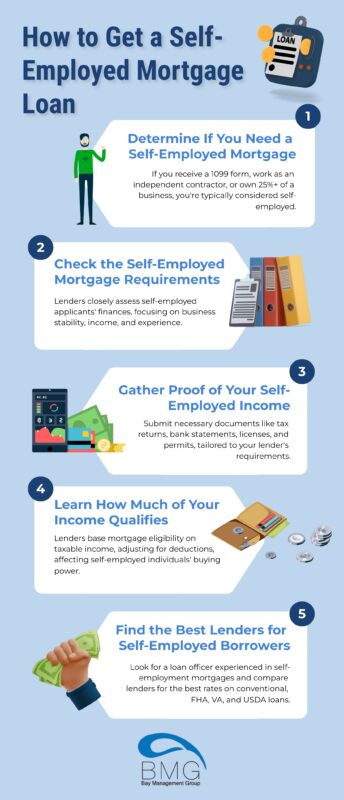 If you’re a business owner looking to secure a mortgage loan, you may find the process a bit tricky. Since you’re self-employed and may not have a consistent income month after month, lenders may be hesitant to fund a mortgage loan. However, getting a self-employed mortgage is not impossible. Read along to learn more about self-employed mortgages, how to get one, and ways to improve your chances of securing one.
If you’re a business owner looking to secure a mortgage loan, you may find the process a bit tricky. Since you’re self-employed and may not have a consistent income month after month, lenders may be hesitant to fund a mortgage loan. However, getting a self-employed mortgage is not impossible. Read along to learn more about self-employed mortgages, how to get one, and ways to improve your chances of securing one.
Contents of This Article:
- What Is a Self-Employed Mortgage?
- How to Get a Self-Employed Mortgage Loan
- Ways to Improve Your Chances of Getting a Mortgage
- What If You’re Denied a Mortgage Loan?
- Protect Your Assets With Professional Management
What Is a Self-Employed Mortgage?
If you’re a business owner, freelancer, or independent contractor, you may find it harder to finance a home or rental property. After all, lenders want to see a steady, verifiable income stream. Without a regular paycheck or W-2 statement, proving how much you make and how often you’re paid can be difficult. As such, many lenders have stricter rules for self-employed borrowers.
However, that doesn’t mean securing a mortgage loan when you’re self-employed is impossible. For instance, if you gather the right documentation and know what to expect when applying for a self-employed mortgage, you can get approved like any other “traditionally” employed borrower. As a property management company in Washington DC, we understand how important it is for rental business owners to be able to expand their portfolios with new properties. So, read along as we review how to get a mortgage when you’re self-employed.
How to Get a Self-Employed Mortgage Loan
Getting a self-employed mortgage may seem daunting, but knowing what information you need and how to navigate the process can make it easier for investors. Here are some of the steps you’ll want to take to get one for your next investment.

- Determine If You Need a Self-Employed Mortgage
- Check the Self-Employed Mortgage Requirements
- Gather Proof of Your Self-Employed Income
- Learn How Much of Your Income Qualifies
- Find the Best Lenders for Self-Employed Borrowers
Determine If You Need a Self-Employed Mortgage
First, determine if you need a self-employed mortgage. If you own 25% or more of a business, work as an independent contractor, or work for a company that gives you a 1099 form instead of a W-2, you’re generally categorized as self-employed. The same is true if your income is documented in Schedule C of your tax returns, meaning you’re a business owner or sole proprietor.
Check the Self-Employed Mortgage Requirements
While your minimum mortgage requirements will be the same as any other borrower, lenders may look a bit closer at your finances since you’re self-employed. After all, they have to know that your business is financially sound and you’re making enough to repay the loan. As such, an underwriter may do some digging to determine the financial health and viability of your business. For instance, they may look at how your business operates, your personal income vs. business income, the stability of your income, and how long you’ve been self-employed.
Gather Proof of Your Self-Employed Income
Like with any type of loan, you’ll have to provide several pieces of documentation to prove you can repay the loan on time. For instance, most mortgage lenders request the following documentation.
- Two years of personal and business federal income tax returns
- Business bank statements and profit-and-loss reports
- Balance sheet
- A copy of your business license
- Proof of business insurance
- State or federal permits
The documents you need may vary depending on your lender, so make sure you check with them and know which documents you need.
Learn How Much of Your Income Qualifies
If you’re looking to buy a home or income property while self-employed, remember that lenders only count taxable income toward your mortgage. That said, your qualifying income may vary depending on whether your business is a sole proprietorship, partnership, or corporation.
Most lenders start with your taxable income and then add back certain deductions, such as depreciation since they are not actual expenses. That said, while you may take as many deductions as possible to save money on income tax, this can affect your mortgage application. For instance, if you earn $8,000 a month, but after deductions, your taxable income is $6,000, it can significantly reduce your home-buying budget.
Find the Best Lenders for Self-Employed Borrowers
To save yourself time and a potential headache, you may want to search for a loan officer with experience underwriting a self-employment mortgage. That said, although you’re self-employed, you can access all the common mortgage types available to “traditional” workers, including the following.
- Conventional Mortgage Loans
- FHA Loans
- VA Loans
- USDA Loans
During your search, make sure to compare lenders and rates to find the best deal for your mortgage loan.
 Ways to Improve Your Chances of Getting a Mortgage
Ways to Improve Your Chances of Getting a Mortgage
If you’re looking to get a self-employed mortgage, there are a few things you can do to improve your chances of being approved. Here are a few tips to boost your odds.
- Improve Your Credit Score- First, focus on improving your credit score and credit history. Work hard to pay bills on time, pay off debt, and stick to your credit limits.
- Lower Your Debt-to-Income Ratio- Another way to increase your chances of securing a self-employed mortgage is to lower your debt-to-income ratio. Most lenders look for a ratio of no more than 36%.
- Make a Larger Down Payment- Finally, putting more money down on your loan can help you qualify for a mortgage. Many lenders require 20% or more, especially if you don’t want to pay for private mortgage insurance (PMI).
What If You’re Denied a Mortgage Loan?
There’s a chance you may get denied a mortgage loan if you’re self-employed. If you aren’t able to show your income or don’t have consistent enough income, traditional lenders may not feel comfortable funding a large real estate loan. However, there are other loan types you may qualify for, like hard money loans or private money loans.
Hard money lenders or private lenders don’t have the same strict requirements as traditional mortgage lenders, so they may be more lenient with your proof of income. However, keep in mind that these lenders often charge higher interest rates and require you to repay the loan much quicker than a traditional lender would.
Protect Your Assets With Professional Management
Securing a self-employed mortgage can seem complicated. However, it doesn’t have to be! As long as you come ready with the right documentation and can show sufficient income, you can find a lender that works for your situation.
If you’re an investor looking to secure a loan for a rental property, you’ll want to think about the next steps–like property management. Luckily, Bay Property Management Group is here to help! We offer comprehensive rental property management services throughout Baltimore, Philadelphia, Northern Virginia, and Washington, DC. Contact us today to learn more about how we can help your rental business succeed!

 Ways to Improve Your Chances of Getting a Mortgage
Ways to Improve Your Chances of Getting a Mortgage